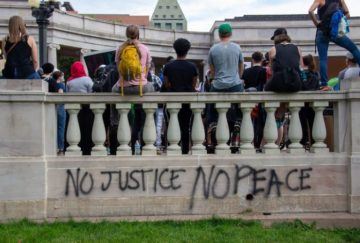Colleen Murphy in Boston Review:
 Transitional justice is both a legal and philosophical theory and a global practice that aims to redress wrongdoing, past and present, in order to vindicate victims, hold perpetrators to account, and transform relationships—among citizens as well as between citizens and public officials. Though it is not as well known in the United States as other paradigms of justice, the framework has been adopted in dozens of countries emerging from periods of war, genocide, dictatorship, and repression, from South Africa to Colombia. As a global practice, the framework began with the recognition that simply moving on hadn’t worked.
Transitional justice is both a legal and philosophical theory and a global practice that aims to redress wrongdoing, past and present, in order to vindicate victims, hold perpetrators to account, and transform relationships—among citizens as well as between citizens and public officials. Though it is not as well known in the United States as other paradigms of justice, the framework has been adopted in dozens of countries emerging from periods of war, genocide, dictatorship, and repression, from South Africa to Colombia. As a global practice, the framework began with the recognition that simply moving on hadn’t worked.
From the vantage of transitional justice, healing of communities can only occur if we first understand what is damaged, and damage can only be repaired if it is truly acknowledged and addressed. And to help to prevent recurrence of atrocity, we need to draw a line between what was accepted in the past and what will be acceptable in the future. The particular measures used to achieve these aims have ranged from truth commissions and criminal investigations and prosecutions to reparations, lustration (vetting government officials for ties to repressive regimes or activity), and other legal and institutional changes.
To illustrate how transitional justice differs from other frameworks of justice, consider restorative justice, which prioritizes the repair of ruptured relationships among victim, offender, and community caused by wrongdoing. Repair occurs via a model of amends—characteristically via apology and reparations—followed by forgiveness.
More here. (Throughout February, at least one post will be dedicated to honoring Black History Month. The theme this year is: The Family)
